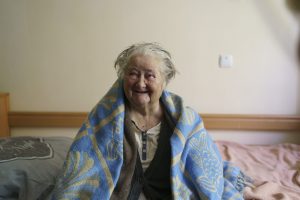 “My house in Severodonetsk was destroyed on 10 April. We were in a shelter nearby at the time and stayed mostly underground for around two months in total.
“My house in Severodonetsk was destroyed on 10 April. We were in a shelter nearby at the time and stayed mostly underground for around two months in total.
“In the early days of the war, it had been okay and we were just hoping that it would be over soon. Then a lot of shelling started. The situation got worse and soon we were cooking on the fire outside. “There was no electricity, no running water. We were often eating dry bread and had to start a fire three times a day. Just before we left, the season changed and it started to rain, so it was really difficult to light it.
“There was an older lady who was left at home without food or medicine on the seventh floor of our apartment block. Volunteers couldn’t get inside. The emergency services came and they broke the door down, but they found her dead already. Her relatives had been trying to enter the city to visit her.
“People found dead without documents are buried in common graves, while those with documents are buried in a separate grave inside a bag. If there are relatives who can pay, they can get a casket. The bodies can be dug up and reburied properly later. There are many graves in courtyards of residential blocks. My niece Anastasia, 48, would ask for help from Baba Yaga (a supernatural being in Slavik folklore) at a tree stump in the yard each day.
“We had three birthdays during our time in the shelter. My mother turned 92 on February 24, the first day of war, mine was on April 10, the day our house was destroyed, and Anastasia’s was on April 25, the day she learned to chop wood for the fire.
“When the shelling started, the ATMs stopped working so I pretty much spent the whole time with 40 kopeks (0,14 USD) ) I had in my pocket. I still have them. For food, we would run up to our apartment in quiet periods to bring supplies down, and those who were evacuating left their products for us.
“We were evacuated by a humanitarian organisation in mid-May – me, Anastasia, her son, Ilarion, 14, and my mother, Rima. Four generations of the same family. Both me and Anastasia are single mothers, so we stick together.
“My son is 30 and lives in San Diego, US. I would like to go to him, but the flight is too long for my mother and we have seven cats and a dog. We also rescued a hamster that was left behind in Severodonetsk by its owners when they fled, and an axolotl that we found abandoned in the basement of our house. We couldn’t just leave them.
“On the day we left, we were crying. I was hysterical – even, you know – punching the evacuation driver, asking him to let me kiss my front door one last time.
“We were told that my mother would be provided with medical care once we made it to a shelter in Dnipro. That hasn’t happened yet, but we are hopeful it will soon. She needs blood pressure medicine.
“My mother, Rima is okay. She’s in sound mind, but she has difficulties walking, especially up and down from the basement. It was very challenging and spending such a long time down there took a toll on her.
“Now we are trying to get on an evacuation train so we can go to Poland. They are free, but if you’re not lucky enough to get a place, you have to pay and we don’t have much. We are in contact with a church we hope will help.”
“My house in Severodonetsk was destroyed on 10 April. We were in a shelter nearby at the time and stayed mostly underground for around two months in total.

“In the early days of the war, it had been okay and we were just hoping that it would be over soon. Then a lot of shelling started. The situation got worse and soon we were cooking on the fire outside. “There was no electricity, no running water. We were often eating dry bread and had to start a fire three times a day. Just before we left, the season changed and it started to rain, so it was really difficult to light it.
“There was an older lady who was left at home without food or medicine on the seventh floor of our apartment block. Volunteers couldn’t get inside. The emergency services came and they broke the door down, but they found her dead already. Her relatives had been trying to enter the city to visit her.
“People found dead without documents are buried in common graves, while those with documents are buried in a separate grave inside a bag. If there are relatives who can pay, they can get a casket. The bodies can be dug up and reburied properly later. There are many graves in courtyards of residential blocks. My niece Anastasia, 48, would ask for help from Baba Yaga (a supernatural being in Slavik folklore) at a tree stump in the yard each day.
“We had three birthdays during our time in the shelter. My mother turned 92 on February 24, the first day of war, mine was on April 10, the day our house was destroyed, and Anastasia’s was on April 25, the day she learned to chop wood for the fire.
“When the shelling started, the ATMs stopped working so I pretty much spent the whole time with 40 kopeks (0,14 USD) ) I had in my pocket. I still have them. For food, we would run up to our apartment in quiet periods to bring supplies down, and those who were evacuating left their products for us.
“We were evacuated by a humanitarian organisation in mid-May – me, Anastasia, her son, Ilarion, 14, and my mother, Rima. Four generations of the same family. Both me and Anastasia are single mothers, so we stick together.
“My son is 30 and lives in San Diego, US. I would like to go to him, but the flight is too long for my mother and we have seven cats and a dog. We also rescued a hamster that was left behind in Severodonetsk by its owners when they fled, and an axolotl that we found abandoned in the basement of our house. We couldn’t just leave them.
“On the day we left, we were crying. I was hysterical – even, you know – punching the evacuation driver, asking him to let me kiss my front door one last time.
“We were told that my mother would be provided with medical care once we made it to a shelter in Dnipro. That hasn’t happened yet, but we are hopeful it will soon. She needs blood pressure medicine.
“My mother, Rima is okay. She’s in sound mind, but she has difficulties walking, especially up and down from the basement. It was very challenging and spending such a long time down there took a toll on her.
“Now we are trying to get on an evacuation train so we can go to Poland. They are free, but if you’re not lucky enough to get a place, you have to pay and we don’t have much. We are in contact with a church we hope will help.”
